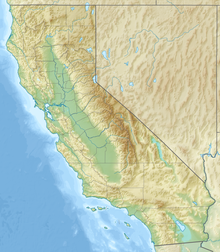Mount Darwin (California)
| Mount Darwin | |
|---|---|

Mount Darwin above Midnight Lake.
|
|
| Highest point | |
| Elevation | 13,837 ft (4,218 m) NAVD 88 |
| Prominence | 1,871 ft (570 m) |
| Listing |
|
| Coordinates | 37°10′01″N 118°40′17″W / 37.1668799°N 118.6714993°WCoordinates: 37°10′01″N 118°40′17″W / 37.1668799°N 118.6714993°W |
| Geography | |
| Location | Fresno and Inyo counties, California |
| Parent range | Sierra Nevada, Evolution region |
| Topo map | USGS Mount Darwin |
| Climbing | |
| First ascent | 1908 by Ernest Clayton Andrews and Willard D. Johnson |
| Easiest route | West Face, exposed scramble, class 3 with summit block class 4 |
Mount Darwin is a flat-topped mountain in the Sierra Nevada, on the border of between Fresno and Inyo counties in Kings Canyon National Park and the John Muir Wilderness of California.
Two Australian geologists, Ernest Clayton Andrews and Willard D. Johnson, made the first recorded ascent on August 12, 1908.
The modern name of the mountain was given to it in 1895 by Theodore S. Solomons and E. C. Bonner of the United States Geological Survey as part of a series of mountains named for the six major exponents of the theory of evolution. Mount Darwin is named for the naturalist, Charles Darwin. Other nearby mountains in the Evolution Group include Mount Mendel, Mount Fiske, Mount Haeckel, Mount Huxley, Mount Spencer, Mount Wallace, and Mount Lamarck. The area around the peaks, known as the Evolution Region, includes Evolution Basin and Evolution Valley.
Nearby landmarks include Darwin Glacier and Darwin Canyon.
A similar exercise in naming mountains after naturalists and other late nineteenth century proponents of evolution theory was carried out at the West Coast Range in Tasmania, Australia. In contrast, Mount Darwin in Tierra del Fuego was given its name during the voyage of the Beagle by captain Robert FitzRoy to celebrate Darwin's 25th birthday on 12 February 1834.
...
Wikipedia

